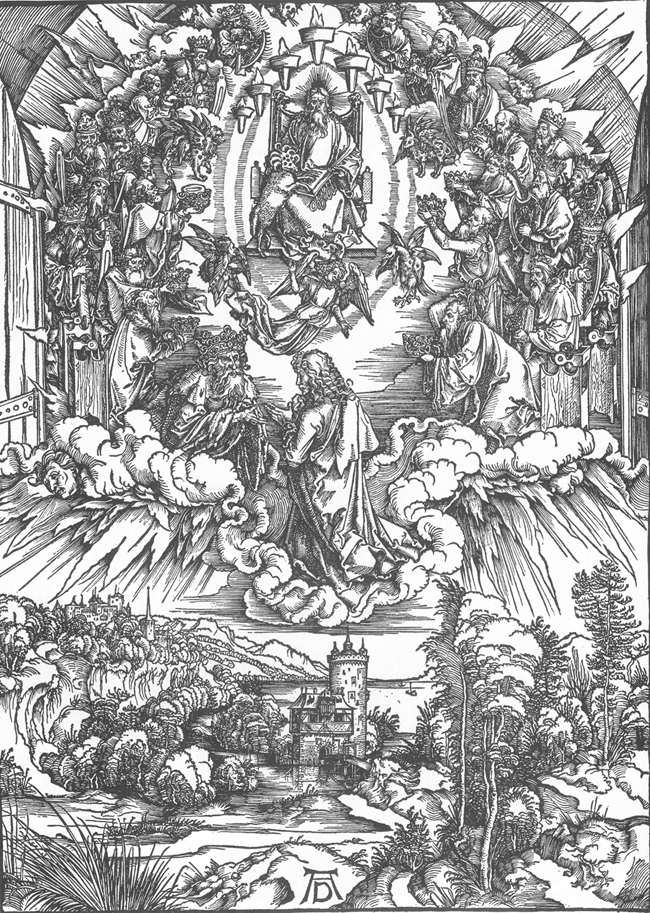
St. John and the Twenty-four Elders in Heaven
Albrech Dürer
Chapter 3
v. 1: I do not really see the connection here between the Self-description and the Message Proper, but there may be a reference to the angels who are “the seven spirits of God” in the Promise where Christ says he will confess the names of the faithful “before his angels” (3:5).
v. 2: Sleep and waking are analogous to death and life.
Perfection is not possible for us; if it were, then Christ would not have had to die to save us from our sins. I think when Christ says he has not found their works to be perfect, he is saying that their works have not met with his expectations, and his expectations (being founded on his divine wisdom and mercy) are always fair. For instance, he may not expect us to be morally perfect, but he expects us to try, with varying degrees of success. Perhaps the Christians he is addressing here have ceased to try.
v. 3: This same image is used in Matthew 24:42-44 in reference to Christ’s second coming on “the great day of God the Almighty” (16:14).[1]
v. 5: It is interesting that, although it is true to say these Christians are (present tense) dead in some sense (3:2), their names are not yet blotted out of the book of life.
v. 7: Here, the connection between the Self-description and the Message
Proper is very clear. The Key of David opens the door mentioned in v. 8.
The Key of David is synonymous with The Keys of Death and Hades (1:18). This key is the key to the kingdom of Israel, and it is called the key “of David” because David is the archetypal king of Israel. Christ is the son of David; therefore, Christ’s kingdom (spiritual Israel) is, in a manner of speaking, David’s kingdom, and we enter that kingdom by the power of Christ. Also, we escape the kingdom of the dead by the power of Christ; thus, leaving the kingdom of the dead and entering Christ’s kingdom (the kingdom of life) are synonymous,[2] and thus The Key of David, and The Keys of Death and Hades are synonymous.
v. 9: See notes on 2:9. It is interesting that both Smyrna and Philadelphia are without blame and that they both are being set upon by this synagogue of Satan. The fact that these Jews are going to bow down at the feet of the Christians at Philadelphia may mean that they are going to be converted to Christianity during the lifetime of the church at Philadelphia, but the language sounds more like the sort of vindication that formerly persecuted Christians will feel on “the great day of God the Almighty” (16:14).[3] Compare this sentiment with that of 2:27.
v. 10: As a reward for their faithfulness, God promises that he will protect the Christians of Philadelphia from a specific time of persecution that will come upon the rest of the world. Oecumenius says, “He means the persecution of Christians that took place in the time of the emperor Domitian” (47-48). This makes sense to me. Domitian was born in 51 A.D., reigned from 81-96 A.D., and was a notorious persecutor of Christianity. Since there are other parallels between the church at Philadelphia and the church at Smyrna (see note on v. 9), I wonder if this is the same persecution that Christ warns of in 2:10.
v. 12: I believe the fact that we will be pillars (with names) in the temple of God is a reference to the famous named pillars of Solomon’s temple: Jakin and Boaz. Both of these ancient pillars were made of bronze and stood in the vestibule (portico) of the temple, Boaz on the north side and Jakin on the south.[4]According to Barnes, Jakin literally means “Direction” and suggests the proposition: “He will establish.” Boaz literally means “Strength” and suggests the proposition: “In it is strength.” Thus, the combined assertion of the two names is “God will establish [the temple] in strength” (Barnes’ Notes 1st Kings 162). I believe that these names (the name of God, the name of the city of God, and the new name of Christ, the son of God) indicate that we belong to all these things, like a brand on a cow indicates that it belongs to a certain farmer. All these names, especially Christ’s new name, may be related in some way to our own new name that we will be given.[5] I wonder what Christ’s new name will signify?
[1] For a discussion of this day, see notes at 20:4.
[2] Compare with Matthew 16:18.
[3] For a discussion of this day, see notes at 20:4.
[4] Their description is in 2nd Chronicles 3:15-17 and 1st Kings 7:15-22.



0 Responses to “Notes on the Book of Revelation: Chapter 3”